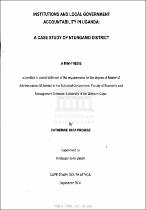| dc.description.abstract | After decades of seeking answers, without much success, to the development challenges facing
third world countries, agencies such as the IMF and World Bank have turned increasingly in
recent years to issues governance and accountability. In Africa especially, the failure of most
development strategies has been attributed to governance issues such as democratic deficits,
corruption and lack of political accountability among others. Uganda like several other African
countries has been criticised for corruption - a sign that the country has a problem with the
functioning of accountability and governance in general. In an attempt to find out whether the
local government institutional mechanisms in Uganda embody possible explanations for
weaknesses in political accountability, this study hypothesizes that institutional arrangements
impact on downward accountability. While concentrating on the anatomy of institutions and the
dimensions of accountability to which they relate, as well as on how the formal and informal
institutions relate to each other, the study gives an insight into how institutions impact on
downward answerability and enforceability at the local level in Uganda. Based on a thorough
consideration of both the theoretical and empirical underpinnings of the concept of accountability,
the study develops relevance criteria upon which an assessment of both formal and informal
institutions' relevance for each of the dimensions of accountability is based. In both cases, formal
institutions are found to be more relevant for accountability than informal ones. Critical issues
about the capabilities of informal institutions are however raised, culminating in a discussion on
the relationship between formal and informal institutions in the study area. While also considering
other variables that interact with institutions in affecting accountability, the study calls for a re
examination in the concepts under investigation namely 'institutions' and 'accountability'. The
study concludes that problems of accountability can be accounted for by weaknesses in
institutional design, conceptual weaknesses in the definition of accountability, as well as
contextual factors such as resource constraints. In the light of this recognition, the study offers
theoretical as well as policy level recommendation | en_US |

